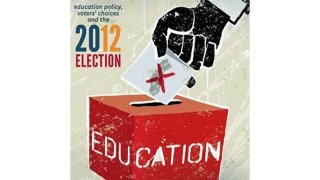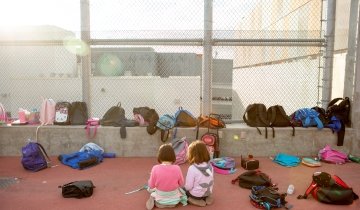The USC Rossier School of Education 2012 polls on state education policy conducted with Policy Analysis for California Education (PACE), a research partnership of USC, Stanford University and UC Berkeley, elicited some surprising results.
A majority of Californians, according to the PACE/USC Rossier Poll, believes that the state should provide additional resources to poorer school districts, even at the expense of schools in their own communities. Another strong finding was that local school districts should hold more control over how money is spent in public schools.
The polls also indicate that voters want principals to have more control over the hiring and firing of teachers, feel strongly about the importance of teachers to student achievement, and support teacher evaluations that are linked to student test scores.
State legislators are out of step with the public on these findings and other educational policies, said poll director Dan Schnur. Schnur, who also leads USC’s Jesse M. Unruh Institute of Politics, said the polls “demonstrated how the state’s elected officials haven’t yet caught up with voters, or with those interested in meaningful education reform.”
The polls, which were conducted in May and August, were the first in a series designed to frame the education policy debate for California legislators.
The results underscored two continuing key problems in California’s education system. One is the state’s failure to target resources to the schools and students who need them most. The other is the heavy burden placed on local educators by the state’s rules on how resources can be used, said David N. Plank, executive director of PACE. “These findings suggest that Californians understand these problems and want them solved,” he said.
Equity in School Funding
The finding that the state should provide additional resources to poorer school districts is particularly unexpected, given the state’s chronic and ongoing budgetary strains. Sixty-seven percent of respondents believe the state should provide additional resources to poorer districts, while 55 percent also said this funding should be provided even at the expense of their own community schools.
California educators agreed that equity is currently one of the toughest conversations in education today, given the extraordinary budget problems districts face. “People don’t want to talk about equity,” said Darline Robles PhD ’94, former superintendent for the Los Angeles County Department of Education and current professor at USC Rossier.
“Superintendents have a real challenge in certain communities which are underserved not just in education, but in all the resources, including parks, transportation, and grocery stores. If you contrast these communities, even in the same district that is well-served
—most importantly by stable family situations—that community has to be made to understand the whys of the equity situation.”
Brown's Ballot Initiative
The August PACE/USC Rossier Poll gauged California voter support for Gov. Jerry Brown’s tax initiative, Proposition 30, which would temporarily raise the state sales tax and taxes on incomes of more than $250,000 to fund schools and public safety.
That poll found a slim majority of Californians favor the Brown tax initiative, but Californians also said they wanted to cut wasteful spending before raising taxes. About 49 percent agreed with the statement that politicians should focus on wasteful spending before raising taxes, compared to 35 percent who agreed that they should “take a stand against further cuts to schools and public safety, make the wealthy pay their fair share and help balance the budget.”
Even among parents, 51 percent agreed the focus should be placed first on cutting waste before raising taxes to fund education and public safety. “These polls show voters don’t buy the ‘we just need more money’ argument,” said Dominic Brewer, Clifford H. and Betty C. Allen Professor in Urban Leadership at USC Rossier and Director at PACE.
“Voters don’t trust the state to control funding, and believe there are major structural problems that need to be addressed, like teacher evaluation, student testing, transparency, and local control.”
The importance of good teachers
The PACE/USC Rossier Poll also confirmed that Californians believe teachers are the most important factor in the classroom. Nearly half said that teachers were most responsible for improving student academic performance in schools, while 22 percent named parents and 5 percent named principals.
The PACE/Rossier Poll found that 81 percent of Californians said teachers contribute “a great deal” to a school’s success. When given the option between using funds to hire more teachers or to increase teacher salaries, two-thirds of Californians said they would choose to hire more new teachers.
Katharine Strunk, assistant professor of education and policy at USC Rossier, said these results indicate voters think it’s better for schools to hire more teachers and shrink class sizes than to pay existing teachers higher wages, which could attract better candidates.
But she says research shows the latter scenario would have a greater impact on student achievement. “Students do better in small classes, but you would need to lower class size so dramatically for that to work in California and the effect of reducing a class by two or three students is minimal compared to having a really good teacher,” Strunk said.
“All evidence shows a great teacher impacts student success not just in school but later in life, on jobs, graduation, and income. I’d rather have my kid in a larger class with an amazing teacher than one that is three or four students smaller with just an average teacher.
The principal's choice
The hiring and firing of teachers continues to be a politically charged subject, and Californians seem to want principals to have more control over the matter. The PACE/USC Rossier Poll showed 47 percent of Californians agree principals should be able to choose the teachers that work in their schools, even if this means reducing the rights of teachers. Forty-one percent of Californians disagreed.
Nearly 80 percent of Californians also agree that principals should have more freedom to fire teachers whose performance is unsatisfactory. Currently, principals are required to hire the most senior teacher who wants a position that is vacant, and with cutbacks of late, there is usually a sizable pool of teachers who were recently laid off that are required to be hired before any other candidates can be considered.
Additionally, California teachers receive tenure after two years, at which time removing him or her requires a lengthy due process that involves the teacher’s union. “Principals don’t have a lot of say over who gets to teach in their schools,” Strunk said. However, she added that principals with more autonomy would mean teachers with fewer rights. There is a precedent for the contracts as they currently exist, says Strunk, and such a tradeoff should be carefully considered.
“Once upon a time, principals and administrators transferred teachers they didn’t like and hired teachers who were their friends, so all of these things are in place in teacher union contracts for a reason,” she said. “If you take away those rights, you may risk those problems arising again.”
Evaluating teachers
Teachers have been thrown into the national spotlight due to recent federal initiatives that mandate student standardized test scores be used to evaluate teachers, such as Race to the Top and the flexibility waiver to the Elementary and Secondary Education Act (ESEA). Meanwhile, teachers unions continue to oppose the use of these tests to assess how teachers are doing.
The PACE/USC Rossier Poll showed 31 percent of Californians think student achievement on standardized tests is the single most important factor in evaluating teachers. Twenty-three percent said teaching experience is the most important factor, and 10 percent named peer evaluations as the most important factor.
Los Angeles Unified School District (LAUSD), which has been piloting a new teacher evaluation system over the past year, recently received a court order to show proof it was using student test scores in its evaluations, according to state law. However, state legislation in the pipeline would require districts to negotiate their evaluation systems with teachers unions, which have been zealous opponents of using student test scores to evaluate teachers. If Bill AB 5 passed, LAUSD’s new system and others like it will likely be jeopardized.
“Everyone would like the districts to work with the unions so teachers have a voice in teacher evaluation, but they have taken a hard stance against using student standardized tests,” Strunk said. “Currently 99 percent of teachers are rated as effective, and we know that’s not true. We need a system where principals know who is truly effective and who is not.”
The PACE/USC Rossier Poll conducted in May, surveyed 956 California adults online and in August, surveyed 1,041 likely California voters online. Brewer said that with the 2012 election upon us, it would behoove elected officials to pay attention to these findings.
“PACE’s mission is to inform policy debate in Sacramento. There is an appetite for greater understanding and recognition of the trade-offs. So our results could encourage and empower more sophisticated politicians. This is additional information that provides an antidote to the simple sloganeering.”





